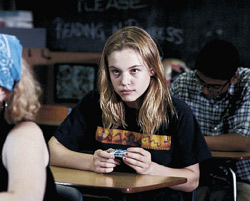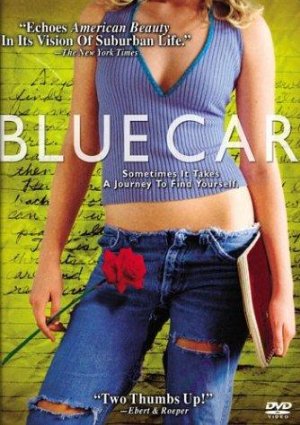Blue Car Review
By Jesse Hassenger

In exploring this relationship, and virtually all of the relationships in the film, Moncrieff and her actors don't shy away from awkward, uncomfortable truths. Strathairn does especially well with this material; although there are only a few scenes of him teaching in front of the whole class, he captures the reserved vibe of a talented, unflashy high school English teacher as instantly as a snapshot. The audience's perception of the Auster character is most open to change over the film's 90 minutes, and Strathairn is a rock of believability, refusing to bother with cheap signifiers when Auster's actions become morally ambiguous (it may help if you find, as I do, almost any cast member from Sneakers infinitely watchable by association). Newcomer Agnes Brucker is equally reluctant to indulge in theatrics; armed with Bruckner's unfussy expressiveness, Meg's every decision is understandable.
Yet as sympathetic as she is, it's hard to really feel for Meg when so much of her character--including her poetry, which at least sounds better than most movie poetry--is based not on personality but reaction, specifically coping. There are odd, welcome moments of levity, such as Meg's early exchanges with the despondent Lily, and an interlude with the drug-dealing older brother of a friend, but much of the film feels consigned to solemnity. Its style is steady, direct, unvarnished and thoroughly respectable. This is a movie destined to be appreciated (if not really enjoyed) by English majors everywhere, for its honesty and care with words.
All of which suggests Moncrieff's own talents may lie in writing more than directing. There is a listlessness about Blue Car that makes the movie seem to move slower than it does. Moncrieff understands the value of economy in a screenplay (this isn't one of those first features that sounds like it belongs on stage), but Blue Car's realistic minimalism isn't always interesting to watch. There is visual storytelling here, but almost exclusively within the bounds of images and symbols that could be easily described on paper. It's rarely based on filmic tools like cinematography or editing. Blue Car's refusal to provide easy answers is refreshing; at no point does Auster reveal that, although it's the end of senior year, Meg really should apply to some colleges and, wouldn't you know it, he has a friend on Columbia's admission board. But its refusal to come alive as a film, rather than just a good piece of writing, ultimately strands its good intentions.
The Blue Car DVD features a commentary from Moncrieff, plus about a dozen deleted scenes, three of which include exceedingly creepy sex scenes with Meg (only one made it to the final cut). If you aren't ready to kill yourself after seeing the movie proper, you will be after watching the extras.
Baby, you can drive my car.

Facts and Figures
Year: 2003
Run time: 96 mins
In Theaters: Friday 2nd May 2003
Box Office USA: $0.4M
Box Office Worldwide: $464 thousand
Budget: $1000 thousand
Distributed by: Miramax Films
Reviews
Contactmusic.com: 2.5 / 5
Rotten Tomatoes: 81%
Fresh: 69 Rotten: 16
IMDB: 6.7 / 10
Cast & Crew
Director: Karen Moncrieff
Producer: Peer J. Oppenheimer, Amy Sommer, David Waters
Screenwriter: Karen Moncrieff
Starring: Margaret Colin as Diane, Agnes Bruckner as Megan Denning (Meg), David Strathairn as Auster, Frances Fisher as Delia, A. J. Buckley as Pat, Regan Arnold as Lily, Sarah Buehler as Georgia, Dustin Sterling as Rob, Michael Joseph Thomas Ward as Dad (as Mike Ward), Wayne Armstrong as Don, Aftab Pureval as Boy in Class, Wendy Lardin as Georgia's Mom, Jenn O'nofrio as Blonde Girl, Greg Miller as Priest, Michael Raysses as Mr. Kastran
Also starring: Amy Sommer, David Waters, Karen Moncrieff














